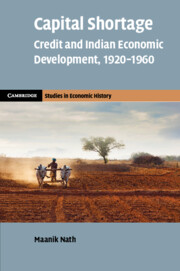
- Cited by 2
-
Cited byCrossref Citations
This Book has been cited by the following publications. This list is generated based on data provided by Crossref.
Nath, Maanik Cheng, Chung‐Tang and Ratnoo, Vigyan D. 2024. Water and development in the Asian tropics, 1900–1939. Asia‐Pacific Economic History Review, Vol. 64, Issue. 2, p. 145.
van Nederveen Meerkerk, Elise and Dixit, Aditi 2024. “Human Beings Are Too Cheap in India”: Wages and Work Organization as Business Strategies in Bombay's Late Colonial Textile Industry. International Review of Social History, p. 1.
- Publisher:
- Cambridge University Press
- Online publication date:
- September 2023
- Print publication year:
- 2023
- Online ISBN:
- 9781009359023
- Subjects:
- History, Regional History after 1500, Economic History


